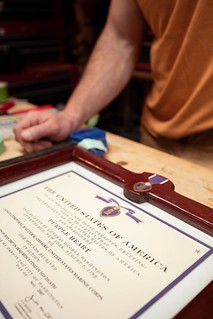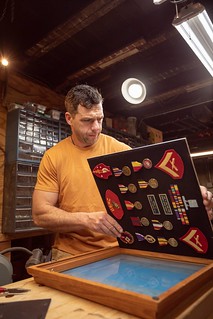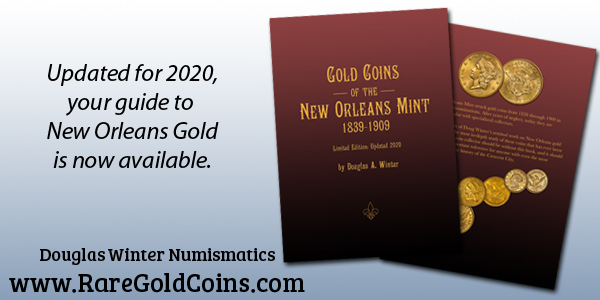
PREV ARTICLE
NEXT ARTICLE
FULL ISSUE
PREV FULL ISSUE
THE AUCTION OF A PURPLE HEARTGerry Tebben writes: "There were two stories in the Wall Street Journal this week that bear on the hobby: One, curiously about Bitcoin and banking before the Civil War and one about the the auction of a Purple Heart. The story is a moving Memorial Day piece on a Marine's effort to return a posthumously awarded Purple Heart to the family. I don't collect military medals, but always and wrongly thought it was illegal to sell them. Auctioneer Bill Panagopulos of Alexander Historical Auctions features prominently in the article, explaining the business of buying and selling historical artifacts. I won't spoil the story for you (It's well worth the read.) but the business part of it should be familiar to everyone in the hobby." Thanks. I'd seen these stories as well. The cryptocurrency one appears later in this issue. Here's an excerpt of the Purple Heart piece. -Editor
Certain medals, like the Purple Heart, stand out like talismans. I thought of Gator every so often when passing by a memorial roster somewhere in the nation's capital, scrolling over the lists of war dead posted in a House of Representatives hallway, maybe. But mostly, all that was in the past. Early this February, I received a message from Charlie Williams, who was a lance corporal on that Golf Company deployment. He had gotten wind that Gator's posthumous Purple Heart certificate, his medals and what was described as the flag that adorned his casket were all for sale through an online auction site called Alexander Historical Auctions.
The items had gone missing years ago, through a series of family misfortunes. For years, Gator's mother, Maureen O'Haire, struggled with finances and threats of eviction. Her house caught fire in 2015, destroying nearly everything. The family saved the few things they could, including the urn containing her husband's ashes. A firefighter who had served with Gator in Fallujah showed up to that blaze, knew where the medals were, and ensured they were recovered. Maureen died soon after, in 2016, and many of her possessions ended up in a storage unit. In the aftermath of the house fire and then Maureen's death, Gator's siblings never found out what happened to the medals. There seemed to have been a lapse in paying the storage fee, but nobody knew for sure. His family certainly didn't want them sold and didn't know who was selling them. The online auction clock was already ticking away when I clicked on the website. The bidding had gotten to a few hundred dollars, inexpensive enough for Gator's friends to come up with, but there were still days left in the bidding. Who knew how high the price might go?
The oldest award The modern version, whose criteria were established in 1932, is awarded to troops wounded in combat. For those who make the ultimate sacrifice, it is presented posthumously to the surviving family.
For collectors, the Purple Heart has become a bauble that can fetch a premium. Some medals are awarded to troops for doing little more than signing up to join the military. But the Purple Heart requires sacrifice and is recognizable to many Americans. It brings the aura of war to the den of any armchair warrior. The monetary cost of the medal is a bargain compared with what was paid by the person who earned it. Those presented posthumously, and which can have the deceased's name engraved on them, are especially tempting to collectors because they are a one-of-a-kind representation of pain, loss and heroism. I've argued against making the sale of any medals illegal. I understand the reasoning and emotions involved, yet the reality is that the marketplace is often what saves these treasures from the trash bin and enables their eventual return. The auctioneer Bill Panagopulos explained it well. -Editor In true Panagopulian fashion, the voluble auctioneer took two hours, three bourbons, dozens of profanities and at least one cigar to explain his mindset over the phone. He told me that it saddens him every time a set of medals comes up for auction because it means that the service member no longer has anyone to care for his or her legacy. Oftentimes, some distant relative finds the stuff in an attic and gets rid of them, sometimes a descendant just needs some pocket money. He's seen it so many times that he figured that was the case with Gator's memorabilia.
And, he added, the collectors he's worked with for decades aren't disrespecting the memory of deceased warriors, on the contrary, they're honoring them. Collectors often buy Purple Hearts and meticulously research the deceased in the National Archives. They display the medals in a place of prominence.
When a family abdicates taking care of a service member's legacy, Mr. Panagopulos feels it's his job to make sure his memorabilia ends up in a place of reverence. Why not in the hands of a dedicated and sympathetic collector? The medals were eventually reunited with the family. It's a great story, well worth reading all the way through. -Editor
To read the complete article (subscription required), see:
Wayne Homren, Editor The Numismatic Bibliomania Society is a non-profit organization promoting numismatic literature. See our web site at coinbooks.org. To submit items for publication in The E-Sylum, write to the Editor at this address: whomren@gmail.com To subscribe go to: https://my.binhost.com/lists/listinfo/esylum All Rights Reserved. NBS Home Page Contact the NBS webmaster 
|


